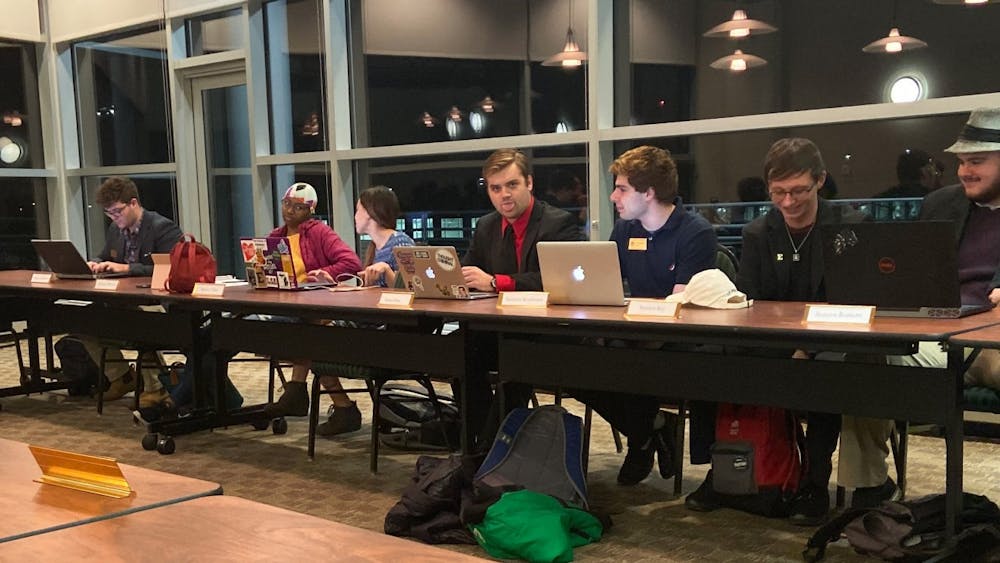The Business and Finance Committee passed Resolution 106-10 last Tuesday, Nov. 12, after amending the order of the line items. The Resolution was then voted on and passed during the Senate meeting Nov. 19.
Student Body President Ethan Smith wrote Resolution 106-10. The resolution would involve Student Government matching up to $15,000 of donations from students that would go toward the Eastern Michigan University Student Emergency Fund. The public crowdfunding campaign will be held over a 30-day period.
Smith explained the structure of the match to the senators, stressing that this is different than Resolution 106-09, the $5 student donation match.
“This is different than the $5 match that we passed at the previous meetings,” Smith said. “So, this resolution would be a match up to a maximum of $15,000 for gifts collected during the crowdfunding campaign. The way that the Foundation structures these crowdfunding campaigns is they give them a time-limit target. That time-limit target is going to be 30 days, and that is why the language in this resolution says ‘up to the $15,000 raised in the 30 days.’
Just to be very clear about how this would be structured before I kind of give a brief advocacy for it and then yield my time, [in the] final be it resolved clause you see a list of five line items in our budget. The way that this would work is that as donations come in, we would match them as they come in out of these respected pools of money.
So, the first pool of money that matches would come out of would be the Student Government Services line item, once we raise $6,000 and we match the $6,000 from the Student Government Services, then we would start pulling from the President’s Discretionary line item until that had been exhausted, and so on and so forth. The last thing that we would pull from if we raised over $10,000 would be the Reserves.”
Smith said that spending Student Government money on this will directly impact and help EMU students in need.
“I just want to say, is this a decent amount of money? Yes. Can we afford it? Yes, I think we can,” Smith said. “I think that this would very carefully pull this money from places in the budget that were below our spending targets. I think this fits well within our operational capacity for the rest of the year.
Finally, I just think this is really one of the best uses of our money. I think it’s hard to argue that we would make more of an impact by doing much of anything else besides making money available to go straight into the hands of a student who really, really needs it in that moment. There’s no middle man, there’s no risk involved, it’s just straight up making money available to a student that really needs it to continue their education. I think $15,000 is a really realistic goal. I think this is a very prudent way to meet a very crucial student need.”
The Senate then moved on to discuss about the resolution.
Senator Nick Galluzzo said he supports the resolution and already voted “yes” on it during the Business and Finance Committee meeting the week prior.
“As you know, I’m on Business and Finance [Committee], and this came before our committee in our last meeting,” Galluzzo said. “I just want to echo some points that President Smith brought up. I think this is a really good idea, especially given the fact that it’s going into the [EMU Student] Emergency Fund to directly benefit students that– that’ll probably need this money the most.
I really can’t think of a better reason to use the budget, use the money that we’ve been given by the university. So I’m just going to say, as a member of the Business and Finance Committee who did pass this along, I would support it and I would encourage others to do the same.”
Senator LaTerricka Osborne asked Smith, without objection from the Senate, what the marketing strategy would be for this crowdfunding campaign.
Smith said he is working with the Foundation to figure out logistics for the best campaigning strategies.
“This is sort of in two pieces, and the implementation is under development,” Smith said. “So one, we are going to be doing the $5 match of student gifts on Giving True Day itself, and that’s gonna be a physical campus-based thing. I have been in talks with [EMU Foundation Director of Integrated Marketing] Austen Smith, and our target is to launch the month-long crowdfunding campaign also on Giving True Day.
So, they’d both happen on the same day, and when you talk about marketing, Giving True Day is gonna help with that because that’s when the Foundation does their big marketing push. And having this in their back pocket will help them create really persuasive marketing and push this to the forefront of giving targets for that day.”
Senator Kirk Suchowesky said he supports this resolution because it is allowing the entire community to work together to help their fellow classmates in need.
“I like this resolution,” Suchowesky said. “I think it’s going to help get the entire EMU community to participate together to help students in need. I think there are a lot of students out there who are struggling, and this is a great opportunity for us all to come together and help them and I am for this.”
Senator Balaal Hollings said he sees fault in the resolution because it caps what is being donated by only matching what students donate, rather than donating as much as Student Government possibly can.
“The only problem I see is that this has maxed what is donated,” Hollings said. “I would say that no matter what is donated, we should be giving these amounts. We identified that students need help, we identified that this is a problem, food insecurity is a problem, home insecurity is a problem, so if they only fundraise $5,000 and we didn’t max that, we as an organization knowing that we have the money to put more, why would we not put more?”
Parliamentarian Jack Swartzinski, in response to Hollings, said Student Government can always pass more resolutions in the future to donate more money, but this strategy would likely receive the best response from students.
“If we don’t match, let’s say they only fundraise $5,000, we could go back and write another resolution making up that difference,” Hollings said. “There’s some flexibility and we have some options, but I think this is the best way we can have a competitive model, which helps promote the fund.”
Galluzzo, adding to Swartzinski’s explanation, said students will respond better since this resolution is essentially doubling their personal donation.
“Coming off of what Parliamentarian Swartzinski said, I think that by doing it as a matching proposal is the best way simply from the optics standpoint,” Galluzzo said. “So, stating that Student Government will match every dollar that you donate instead of stating, ‘Oh, well, Student Government is just gonna donate $15,000 anyway.’
I think that having it matched gives people the incentive to donate in so that whatever they are donating is basically doubled, that they’re getting double for their money. So, I think doing it this way is the best way to move forward. And as Parliamentarian Swartzinski stated, if we want to give more, there’s always the resolution process to do that later on if we don’t think we gave enough to the fund.”
The Senate then made a motion to vote on the resolution.
Resolution 106-10 passed in the Senate with 18 “yeses” and one “no.”










